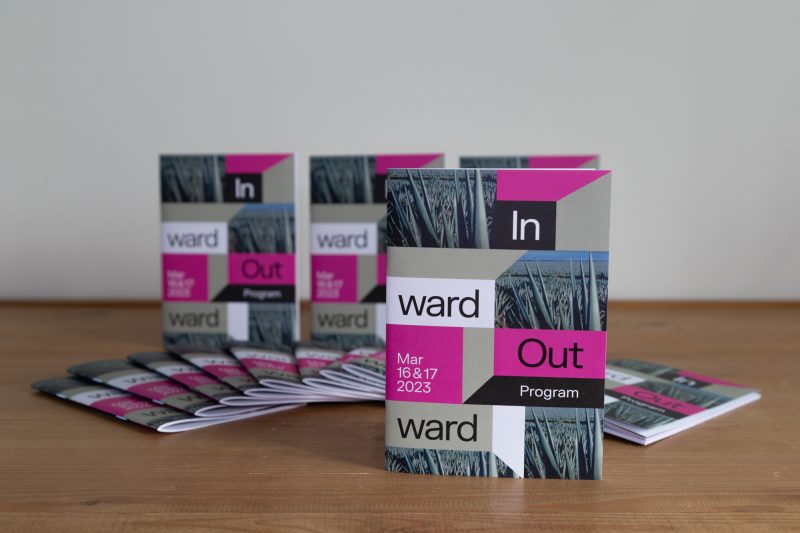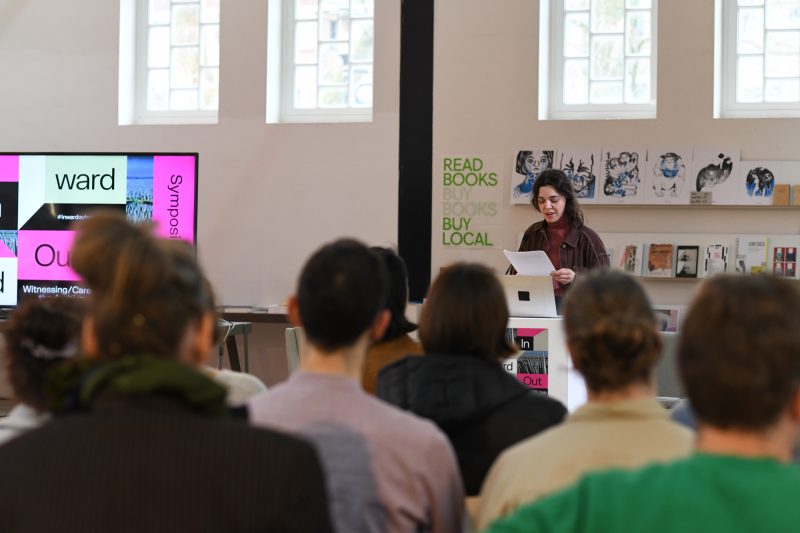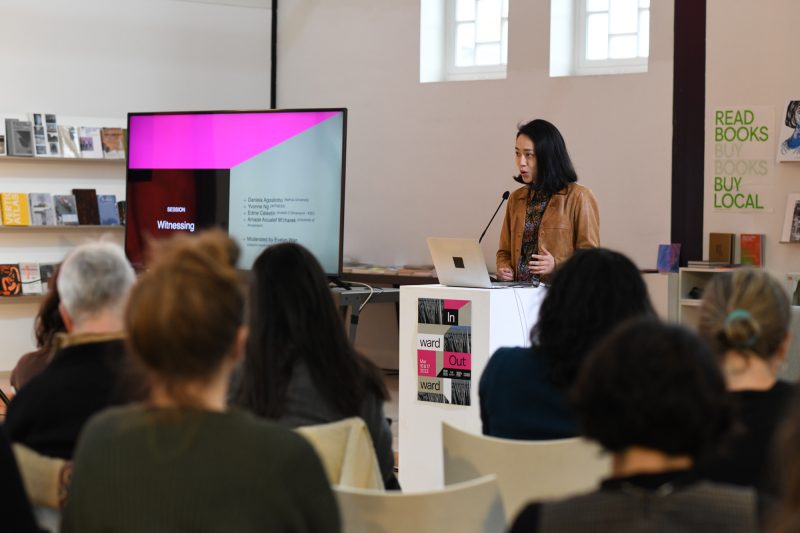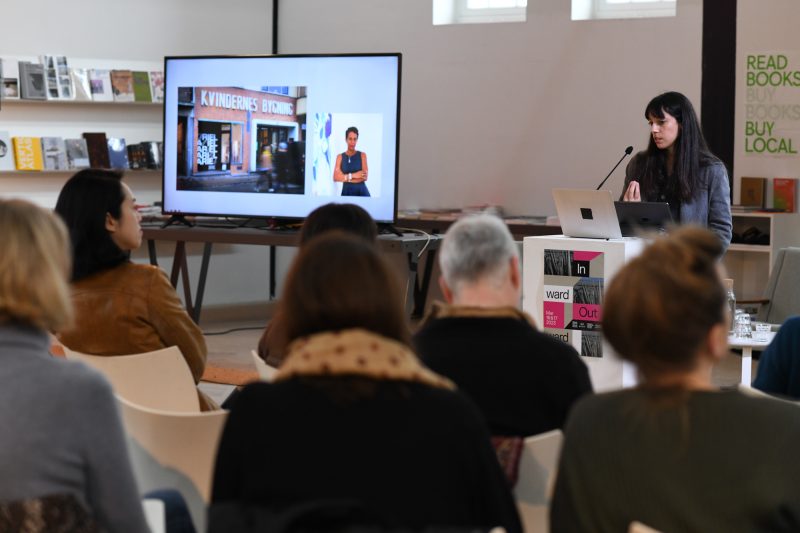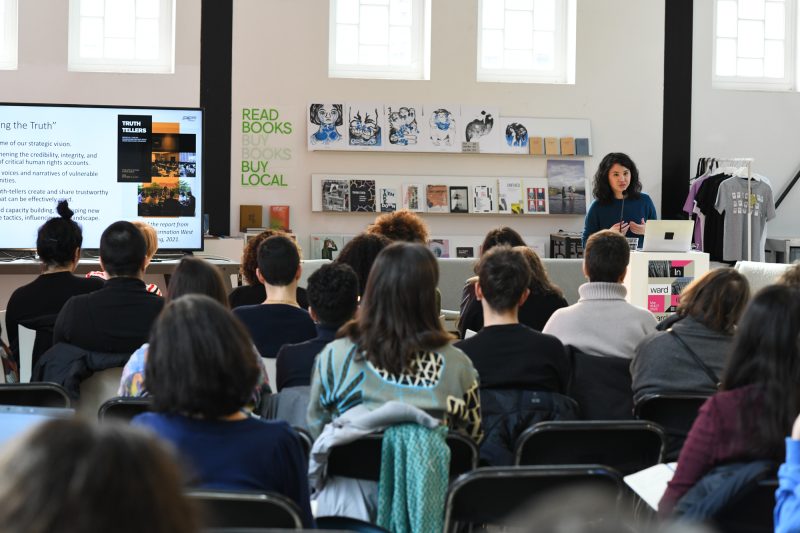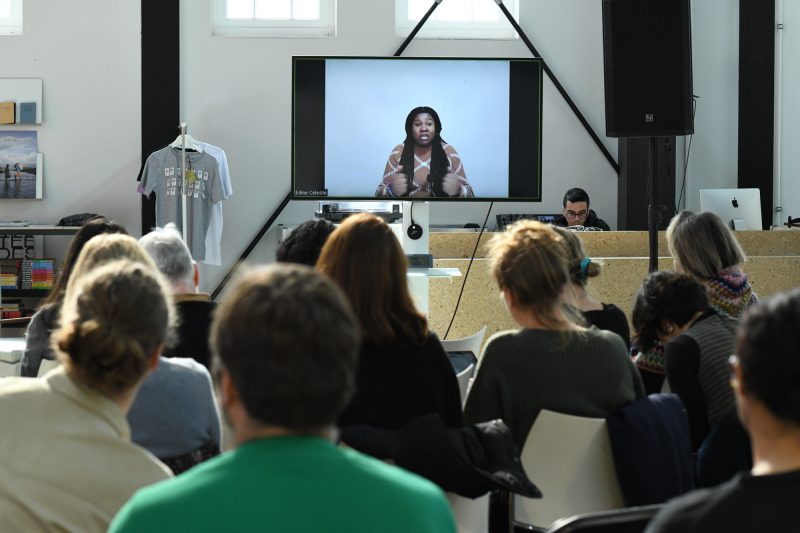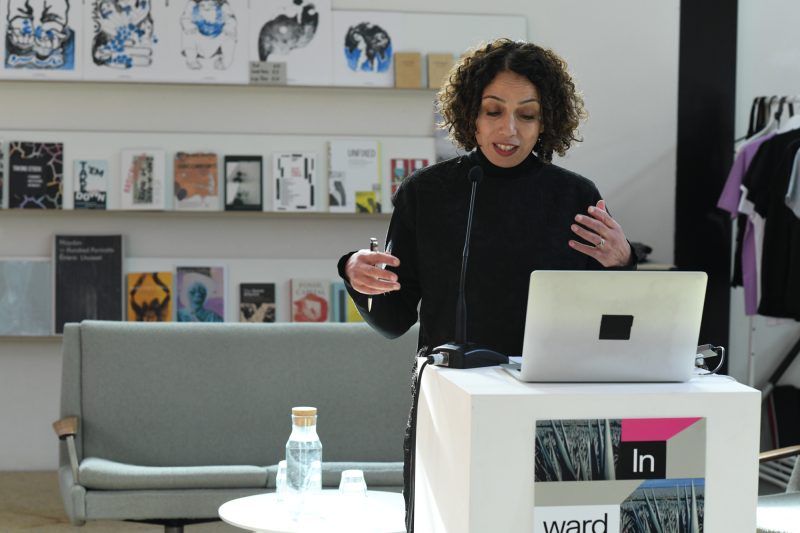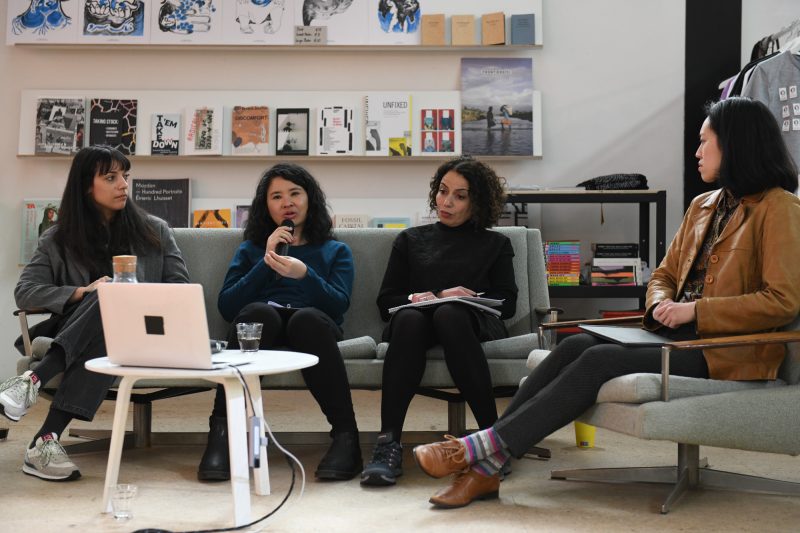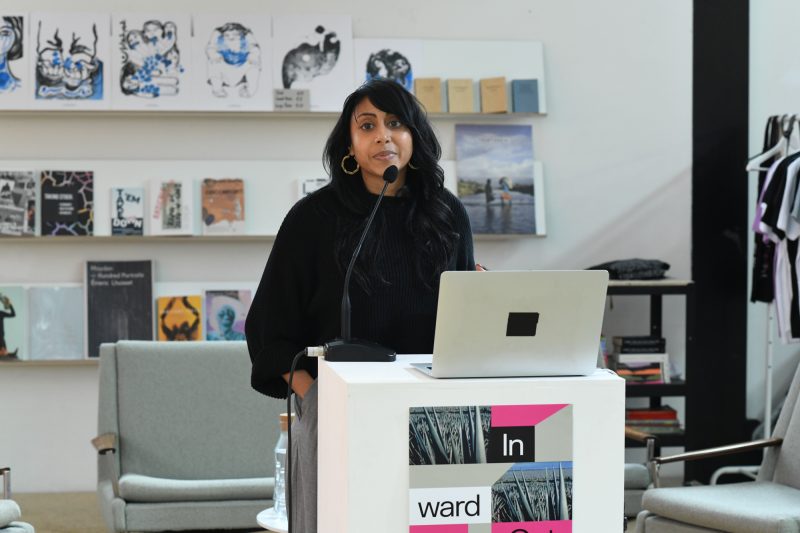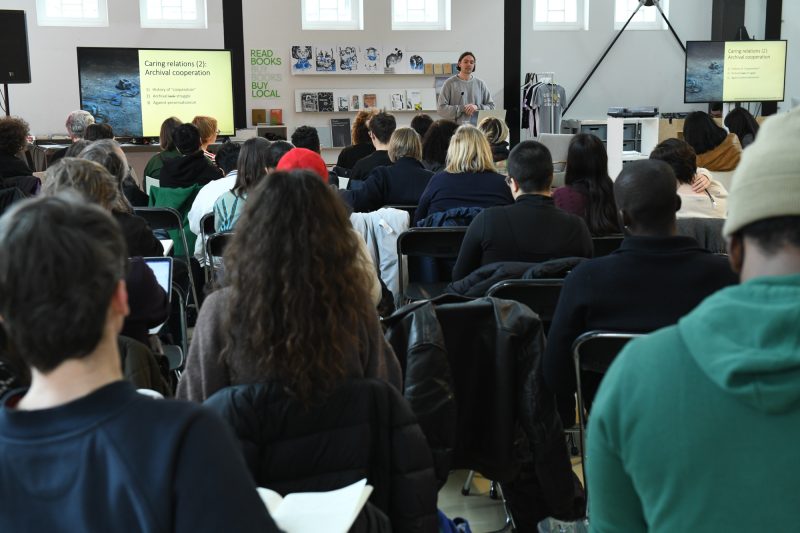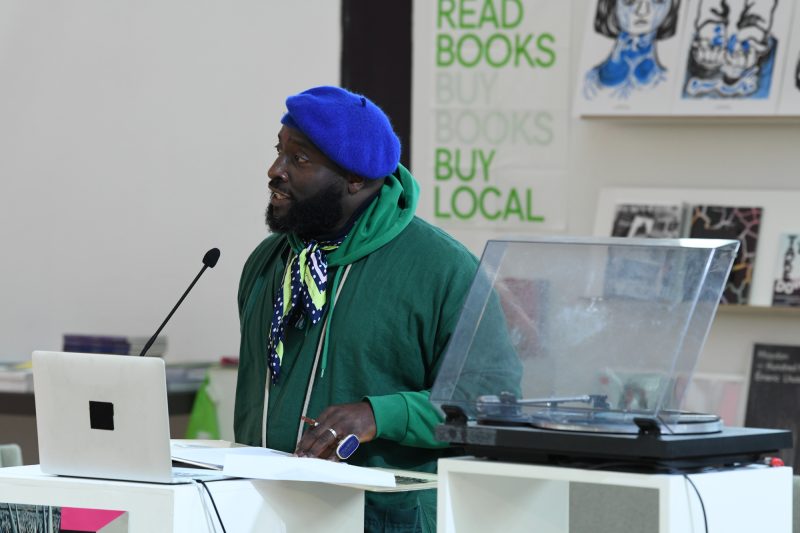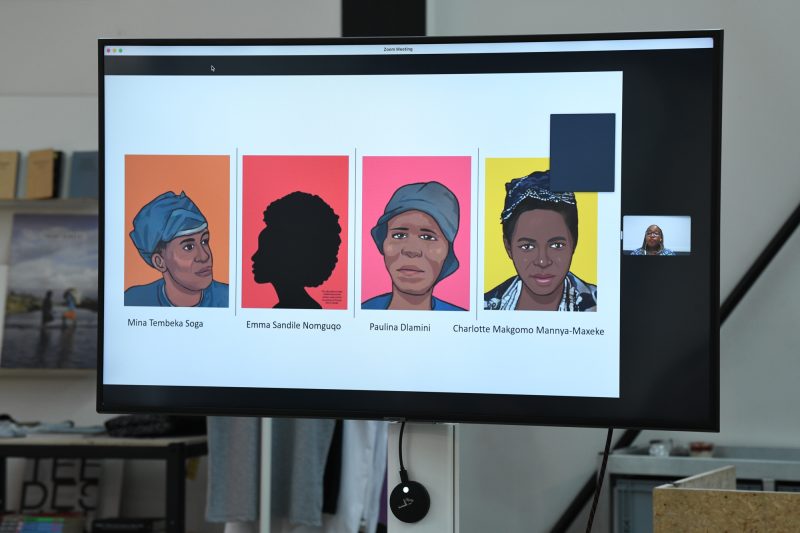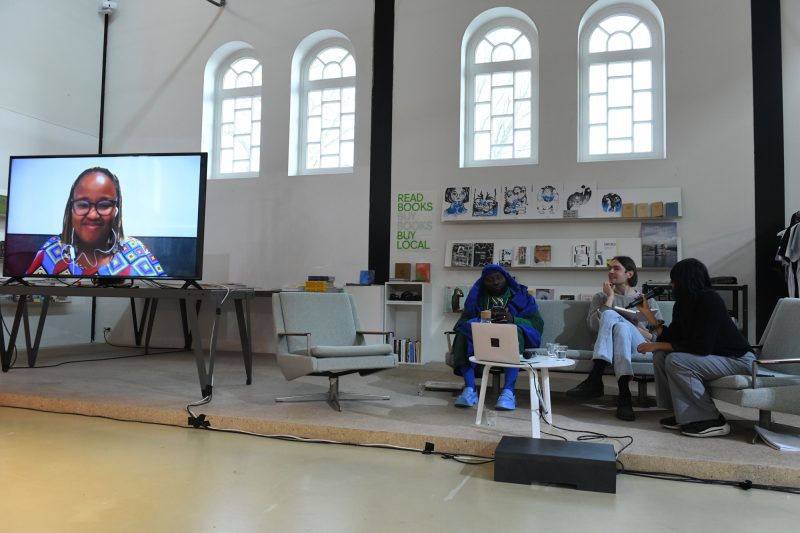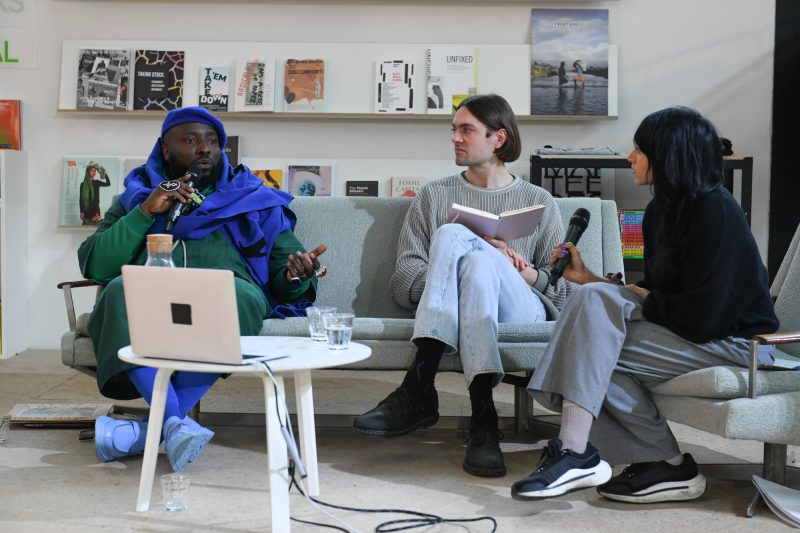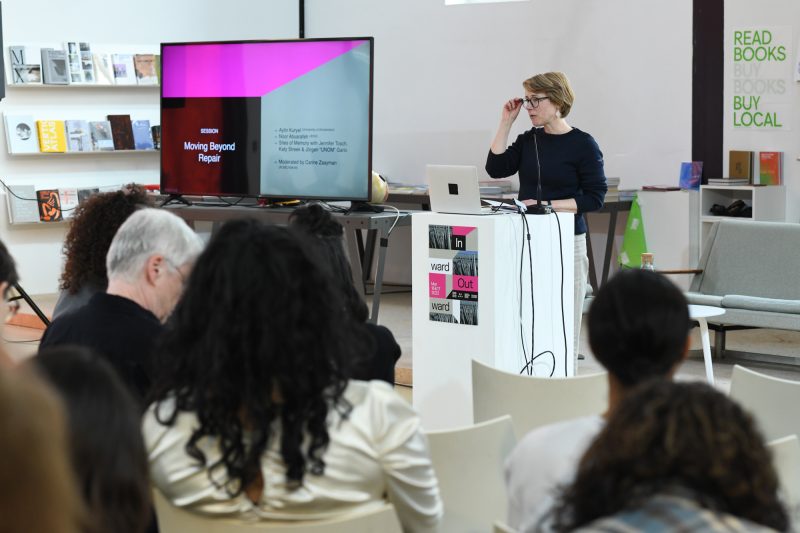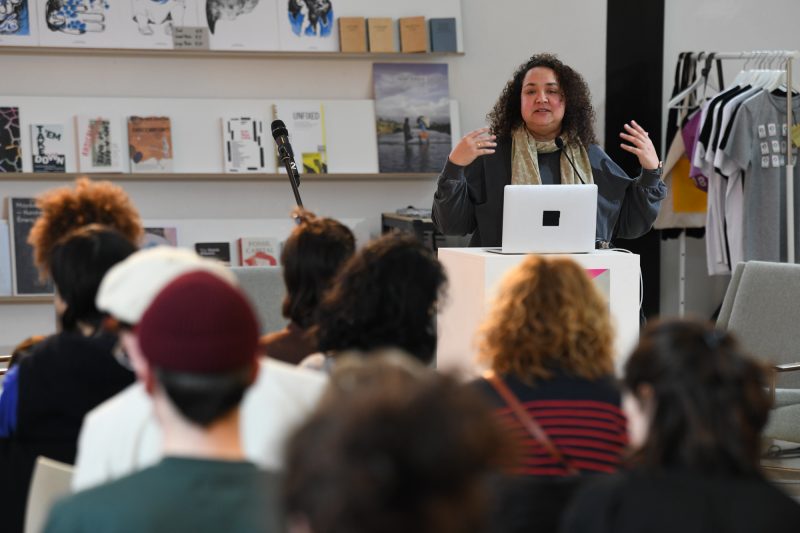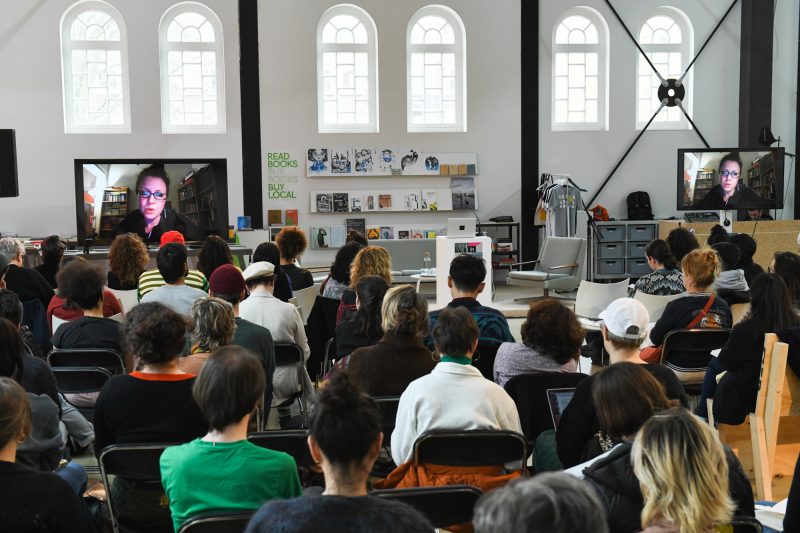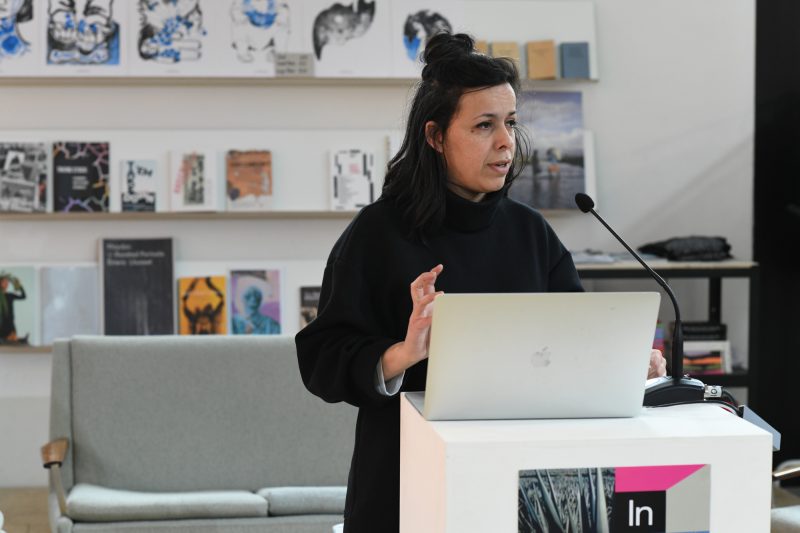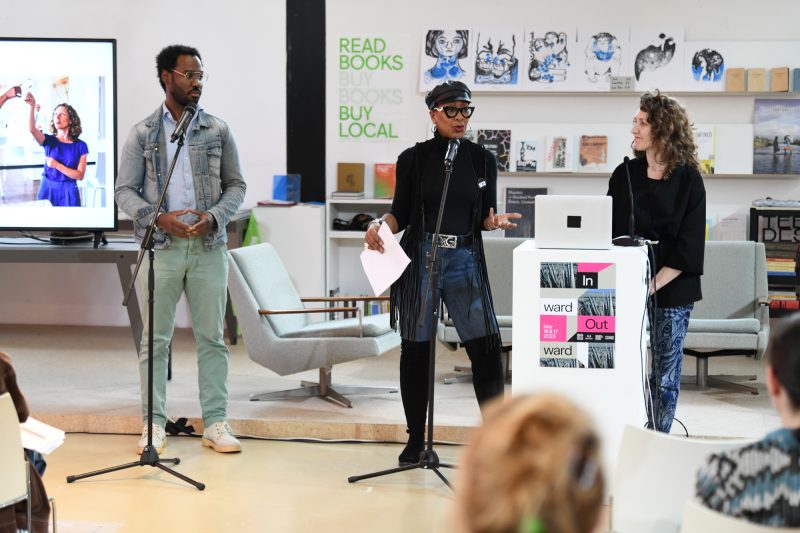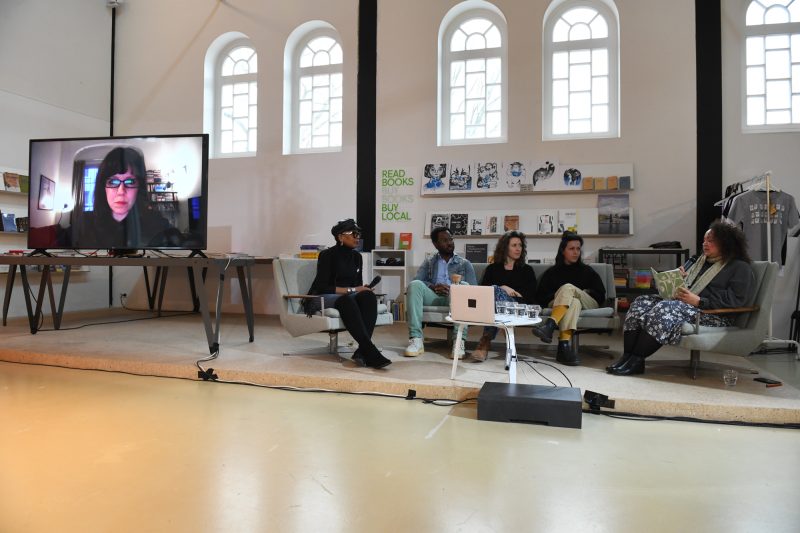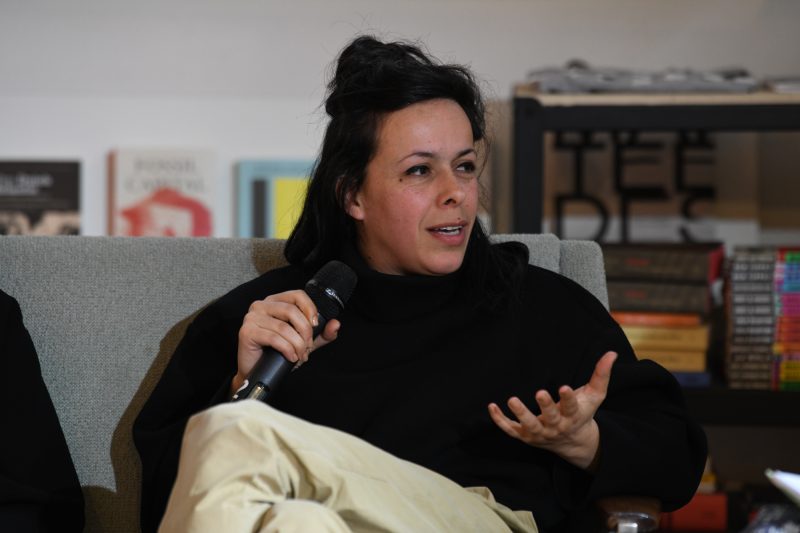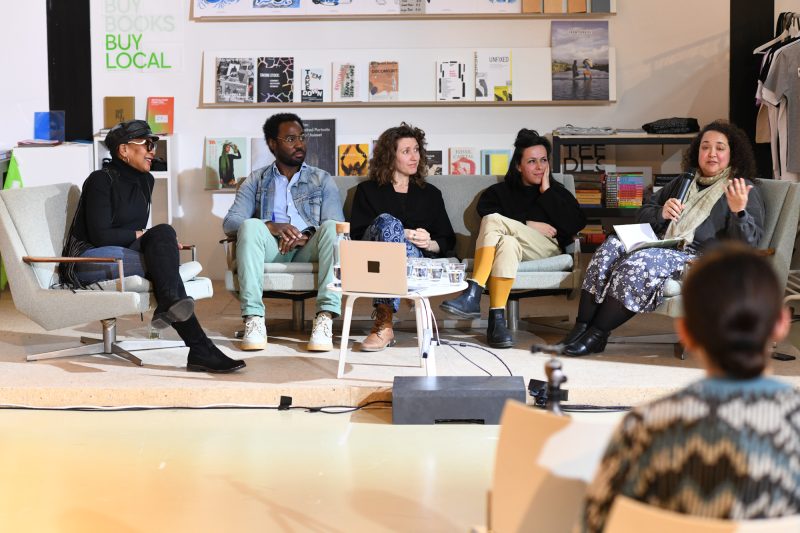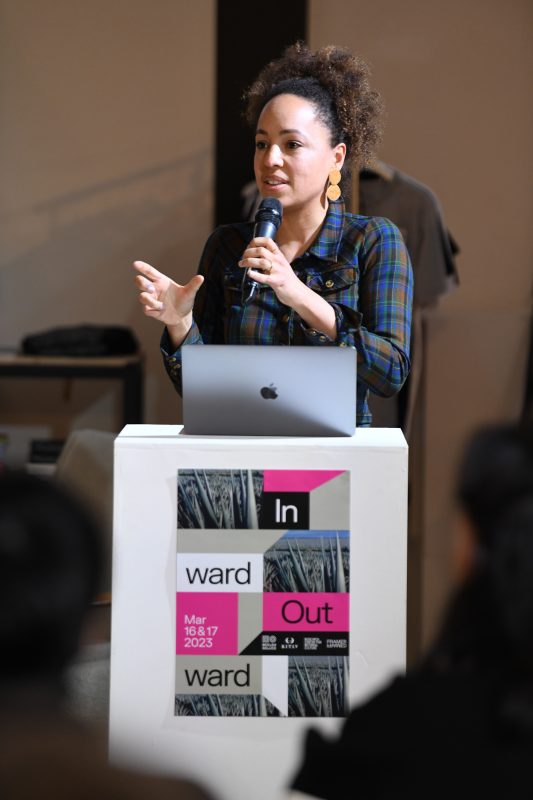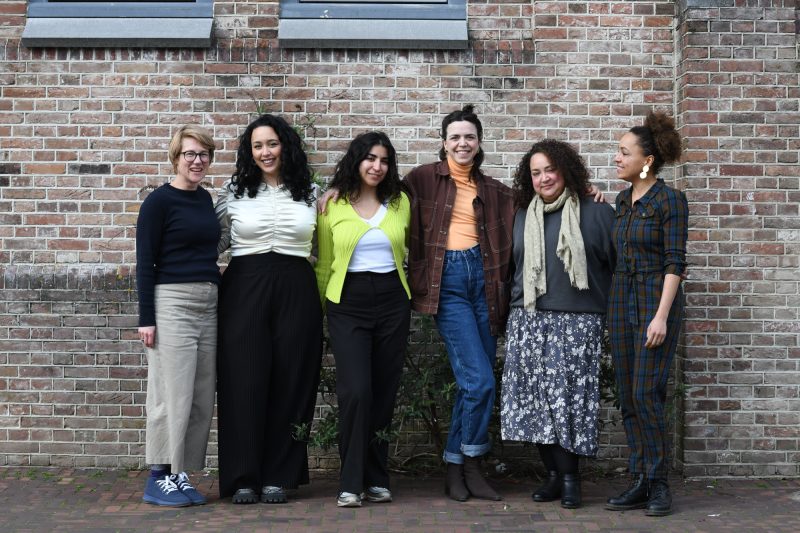Witnessing/Care & The Archive
Past Edition: March 16 & 17, 2023

Witnessing/Care & The Archive
The symposium Inward Outward investigates the status of moving image and sound archives as they intertwine with questions of coloniality, identity and race. Here, the archive is understood as resting in both physical structures (e.g. national, regional, local or personal) and less tangible ‘cultural archives’ (e.g. beliefs, knowledge, collective memories). Through the symposium, we bring theory and practice into dialogue by drawing together people from different professional and creative backgrounds.
The third Inward Outward takes place on March 16-17, 2023 at Framer Framed (Amsterdam) as a series of three lecture/conversation sessions and a workshop. This iteration of the symposium will focus on Witnessing/Care, with these two terms articulated in tandem. We mobilise Witnessing/Care together, as complementary practices, calling to each other as tools to move through the archive, but that may also be wielded in tension. As we outline below in relation to each term, deploying these words as verbs highlights a form of implication, a refusal to conceive of archival work as a passive performance.
Read more +
Already articulating the nexus between witnessing and caring, Deborah Thomas invites us to “cultivate archives through attentive embodied care, in order to recognize and respond to the psychic and socio-political dynamics in which we are complicit, and therefore to generate the ability to be response-able, to ourselves and to others” (Political Life in the Wake of the Plantation 2019, 2). For Thomas, this embodied care is a form of witnessing—a witnessing 2.0—that is implicated, present and relational. Not subjugated to ideology, and demanding more than recognition, this witnessing 2.0 echoes James Baldwin’s 1984 self-positioning as an involved relator of injustice (See Conversations with James Baldwin, edited by Louis H. Pratt, 1989, amongst others). Baldwin’s writings not only envisage the act of witnessing as a recounting of prejudice and discrimination, but simultaneously, a documenting of the witness’s relationality and a duty to record possibilities for thinking and imagining otherwise. Witnessing and caring, then, are concurrent embodied acts of being, recording and imagining. As Kelly Oliver explains, it is only through such implicated articulations of caring and witnessing that “those othered can begin to repair damaged subjectivity by taking up a position as speaking subjects” (Witnessing: Beyond Recognition 2001, 7).
Inspired by Thomas, Baldwin, Oliver, and others, Inward Outward brings a feminist ethics of care and witnessing into conversation with decolonial critiques, situating these terms within the histories—that is his/her/their/our-stories—in which they are embedded. We are intent on aligning an ethics of care and a praxis of witnessing with a critical reorientation of colonial archives. As such, we invite participants to think about witnessing and archival work beyond the actions of hearing, seeing and recording; to recount their engagements with archives of coloniality as care work, through care, and/or as witnesses. To facilitate conversations along these lines, we articulate this symposium edition around a main question: how do we witness the violence of coloniality with care for archives and the voices, bodies and spirits they house or manifest through?
Re-centering the specificity of Inward Outward’s attention to sound and moving image, we ask: What emerges when we think of embodied witnessing through archives of sound and film? What other senses are called upon, distilled, transformed, or re-imbued into the archive when archivists are witnesses? And, does thinking with sound and moving images shift our perspective of what care might look like or be?
Speakers & Moderators
Amade Aouatef M’charek (University of Amsterdam), Athambile Masola (Poet, Writer, Researcher and Lecturer, University of Cape Town), Aylin Kuryel (University of Amsterdam), Bonaventure Soh Bejeng Ndikung (Haus der Kulturen der Welt – HKW), Carine Zaayman (RCMC/NMvW), Daniela Agostinho (Aarhus University), Edine Célestin (Kolektif 2 Dimansyon – K2D), Evelyn Wan (Utrecht University), Nikolaus Perneczky (Queen Mary University of London), Noor Abuarafeh (Artist), Priya Swamy (Nationaal Museum van Wereldculturen), Sites of Memory (Jennifer Tosch, Katy Streek & Jörgen “UNOM” Gario), Stevie Nolten (Sound & Vision), Yvonne Ng (WITNESS)
Programme
Day 1 – Thursday March 16, 2023
Witnessing—as a verb—always combines the aural and the ocular. Bearing witness, in its common understanding, usually entails recounting something heard or seen. Witnessing also holds religious and legal connotations. These resonate with legal processes of ‘bearing witness’ and Christian evangelizing, and to being ‘called on’ by a higher lawful or spiritual order. If these legal and religious dimensions invoke the dutiful aspect of witnessing, they do not necessarily imply an engaged praxis. When connected to care however, understandings of ‘witnessing’ are further fleshed out and given more intention. Witnessing as care can only be intentional and in relation with that or those which are cared for.
For this Inward Outward session, we invite four speakers who directly engage with witnessing as an embodied practice and relational ethos to present their work and engage in a discussion. Amade Aouatef M’charek, is Professor of Anthropology of Science at the University of Amsterdam. Her research interests are in forensics, forensic anthropology and race, with a particular focus on the social aspects of various biomedical technologies and practices. Daniela Agostinho is Assistant Professor at Aarhus University, where she probes the aesthetics and politics of colonial archives in her work on witnessing and archiving war, and in her cultural studies of digital and emerging technologies. Edine Célestin is a photojournalist and human rights activist whose recent book is Kazal – The Memories Of Kazal, A Photographic Approach, published with André Frère Éditions. Yvonne Ng is Senior Program Manager of Archives at WITNESS, an organization that helps people use video and technology to protect and defend human rights globally. In conversation with Amade, Daniela, Edine and Yvonne, we explore what an embodied practice of witnessing reveals and demands of our archival work. We ask, among other things, when is archival evidence of colonial violence evidentiary enough?
MODERATOR
→ Evelyn Wan (Utrecht University)
SESSION PRESENTATIONS
Vital Elements Post_Colonial Flows: Forensics as an Art of Paying Attention
→ Amade Aouatef M’charek (University of Amsterdam)
Since 2014 more than 23,000 people have drowned in the Mediterranean Sea. They have been attended to as “border death” (Last & Spijkerboer, “Tracking Deaths in the Mediterranean”, 2014), crucially, drawing attention to the militarization of Europe’s borders and its migration policy. But what if we made a decolonial move and crossed the Mediterranean, from Europe to Africa? What if we attended to death, not in relation to borders that kill, but in relation to life and livelihood?
The starting point for this talk are the beaches of Zarzis, a southern Tunisian harbor town, where dead bodies have been washing ashore since the mid-nineties. I ask “how did these bodies end up here?” A forensic question that I will not engage in any self-evident way. I reconfigure forensics, from an art of mobilizing evidence and finding closure, to an art of paying attention. A mode of opening up and articulating complex entanglements.
Inspired by forensics, its attention to materialities and temporalities as well as its tenet of following heterogeneous traces, I query the relation between death and the possibilities for life and livelihood by trailing vital elements and the relation between them. Vital elements, I suggest, are materialities that are crucial for fostering life or causing death in their absence. Think of phosphorus, salt, water, or sea sponges. Moving with, and being moved by these materialities and the way they have been part of extractivist practices, I will demonstrate how they help us to see the durability of unequal, (post)colonial relations, underscoring what can flow easily and what is being stopped between Europe and Africa. But these materialities also alert us to the fact that rather than “Europe’s migration crisis” what we are witnessing is a chronic situation of producing life and death.
Curating Ghostly Matters: Spectral Evidence, Witnessing and Colonial Archives
→ Daniela Agostinho (Aarhus University)
As museums, archives and other cultural institutions make their colonial collections digitally available online—giving contested materials a digital afterlife— unresolved histories and new ethical matters are bound to emerge. What can be traced, remembered and imagined through archives rife with omission and harm? And how do we care for the presences and absences they conjure? (Odumosu, “The Crying Child: On Colonial Archives, Digitization, and Ethics of Care in the Cultural Commons”, 2020). In this presentation, I reflect on the exhibition For Alberta and Victor: a collection of conjurings and opacities, by visual artist La Vaughn Belle, that I curated with ARIEL – Feminisms in the Aesthetics in Copenhagen (2021). Grappling with the question, posed by Inward Outward, of “how do we witness the violence of coloniality with care for archives and the voices, bodies and spirits they house or manifest through”, I reflect on Belle’s engagement with the visual archives of Danish colonialism and how she devises a spectral approach to evidence that incites a poetic requalification of witnessing. By approaching the archive as a departure point rather than a site for answers, Belle critically turns away from documentary evidence towards reaching to other sources of proximity and communing with ancestors. Thinking through ghostly matters and care together, this presentation discusses how Belle’s ambivalent engagement with archives seeks to more intimately register absent presences, calling forth a reconsideration of witnessing that not only requires a sensorial recalibration but also a sensibility towards the ghostly, transient, and interior.
Living Archives in a Memory Project
→ Edine Célestin (Kolektif 2 Dimansyon – K2D)
As a medium, photography is one possible way of narrating memory next to more ancient ways such as oral storytelling, writing, theater, etc. At the same time, as a form of witnessing the past, photography is a substance and can be a source of historical knowledge. It reactivates the memory of a historical fact and invites reflection. Photography remains a fragmentary witness, partial, subjective, polysemous: a photograph tells us as much about the photographed subject as it does about its photographer. It remains an interpretation of reality that is never fully within grasp.
KAZAL is a photographic project that traces the memories of the dictatorship of François Duvalier in Haiti through the history of Kazal, a village north of Port-au-Prince in Haiti, where a major event in the contemporary history of the country was perpetrated in March 1969 and obliterated from official history: the massacre of Kazal.
Only rare traces of materials and a few witnesses of this history have withstood the ruin and the passage of time. In line with our previous works, we tackle the challenge of documentary photography head on, conducting interviews, researching sources and fieldwork, and in constant dialogue with the subjects photographed.
This journey was forged by the deep connection with the residents, on the trust built and nurtured over the course of the years between 2015 and 2018, and on many successes and failures. What ultimately prevailed was the determination to return to these same places, to listen, to share, and to bring new research leads, new images, new witnesses.
Over the course of three years, we created a dialogue with the inhabitants of Kazal to interrogate their memories of places and events. For us, what ensued was a true encounter with Haiti’s troubled history and past that, to this day, has not yet been acknowledged.
*Joining online
Strengthening Community-Based Human Rights Video Witnessing
Misinformation, AI-enabled deepfakes, and authoritarian attacks on truth are on the rise, eroding societal trust in human rights witnessing and video documentation. In response, video documentation strategies and tactics are growing in sophistication to better signal and verify authenticity. Some of the new approaches and tools, however, exclude human rights defenders who could use them the most. Developed within dominant communities of practice in archiving, OSINT, and curation centered in the Global North, these methods often do not suit contexts in the rest of the world, and promote standards that are unrealistic for most to meet.
WITNESS works to democratize access to human rights video skills and resources, while recognizing that the burden of witnessing should be a choice, not an obligation, especially for people impacted by human rights violations. Moreover, we recognize that witnessing and presenting trustworthy evidence is, frustratingly, often not enough to make a difference. Through a combination of direct collaboration with community-based partners; continuous listening, learning, and sharing of knowledge; and systems-level advocacy, WITNESS aims to help others secure human rights change using video and related technologies, aligned with the goals of communities and people who most directly experience human rights violations, and building their power and voice.
At its most basic, caring for archives is about ensuring they are safe, shielded from intense light, protected from humidity, and cataloged for easy access. It relates to the routine tasks of restoration, collating, filing, digitizing, describing, cataloging etc. that archivists perform. Yet, recent calls for a feminist ethics of care in archival praxis remind us that care work is embroiled in questions of attentiveness and responsiveness (Agostinho “Archival Encounters: Rethinking Access and Care in Digital Archives”, Archival Science 19 (2019): 141–165; Schares “Witnessing the Archive: Stormé DeLarverie and Queer Performance Historicity”, Text and Performance Quarterly 40.3 (2020): 250–267). It is concerned not only with the vulnerability of archives as material but also with the responsibility of the caregiver to witness the voices, flesh, and stories of the archived / as archives. Here caring is an embodied disposition, purpose and praxis that encompasses and supersedes the daily undertakings of working in and with archives.
In dialogue with our speakers, this session aims to unpick the multiple, layered and sometimes contrary articulations of care. Centering a feminist approach to archives of / with care, we engage with Athambile Masola, Lecturer at the Historical Studies Department of the University of Cape Town, and her work on Black women’s historiography and life writing. With reference to the work of Teresa Lanceta and Lester Brown, we work through the deviations of care and its appropriation by capitalist and supremacist structures with Bonaventure Soh Bejeng Ndikung, Director of Haus der Kulturen der Welt (HKW) in Berlin, thus exploring the layered and contrary notions that care work carries with regards to the colonial and its archives. And we explore how moving image restitution might be articulated through a framework of care with Nikolaus Perneczky, Leverhulme Early Career Fellow at Queen Mary University of London, thus probing the relationship between care and release.
MODERATOR
→ Priya Swamy (Nationaal Museum van Wereldculturen)
SESSION PRESENTATIONS
Ukugcina amagama: Keeping Names
→ Athambile Masola (Poet, Writer, Researcher and Lecturer, University of Cape Town)
My presentation will be a reflection on the practice of care in two projects: Imbokodo, Women Who Shape Us as well as A Stranger at Home (a collection of columns written in 1977 by Noni Jabavu). Both projects are collaborations where I am co-author with Xolisa Guzula and Makhosazana Xaba (respectively). This approach to writing and historical work is a deliberate form of feminist labor with co-creating as an ethic. To care in isiXhosa (my mother tongue) is ukukhathala (v), inkathalo (n) which relates to words such as ukugcina (to keep). These projects are concerned with telling stories and preserving. Both required connection with family members and, if the people we were writing about were still alive, direct communication with them for access to images and fact-checking the biographies. None of these works were commissioned but rather they emerge from a labor of love. Which is to say, to care is to love. What does it mean to love black women, their lives, and their stories enough to recreate them with future generations in mind? What does it mean to care enough about recreating portraits of black women with enough care so that they are aesthetically pleasing for a young audience? What does it mean to care for the dead in order for them to be the living-dead through retelling their stories? These questions mirror the debates which took place behind the scenes in each of these projects.
*Joining online
Tangentiality of Care? All That Magic. Teresa Lanceta’s Threads Weave and Unweave Lester Bowie’s Sonic Pluriverse
→ Bonaventure Soh Bejeng Ndikung (Haus der Kulturen der Welt)
There is an inflation of discourses on care. A care that is discussed but doesn’t care about the practice of care. A care that is limited to the surface rather than profundity. This lecture will not discuss care for care’s sake. It will not put cosmetics on the face of careless care, but will tickle out a care for knowledges, histories, spiritualities, politics and ways of being in the world using Teresa Lanceta’s threads to weave and unweave Lester Bowie’s sonic pluriverse.
A look at Teresa Lanceta’s tapestry provokes sound. Sounds that seem to invoke notations or scores for Bowie’s All the Magic. Not just because of the magic in Lanceta’s work, but because of certain phrases, idioms, narrations, mind spaces and landscapes that both the sound and the tapestry seem to interweave. As if Lanceta were writing the score of Bowie’s music after the music had been made, or writing a musical notation that already existed in the noosphere. A kind of writing backwards. A kind of writing back. For more than four decades, Teresa Lanceta has used the medium of weaving to pack histories into symbols and unpack histories from crevices and vaults of the past. For history is not of the past but of the present.
How do we care for histories, especially those histories we don’t find in history books? How do we care for those other non conventional spaces in which knowledges are found? How do we care for the epistemics of murmurations, of hummings, of innuendoes, of gossips, or rumours?
Displaced and Contested Film Heritage: On Discourses and Practices of Care in Global Audiovisual Archiving
→ Nikolaus Perneczky (Queen Mary University of London)
The discourse of care has done much to draw our attention to the profound interdependencies that shape contemporary life, while also showing that the burden of care is unevenly distributed both locally and globally along gendered and racialized lines. Caring for moving images—the preservation, restoration, curation, and archiving of films—raises related but distinct questions, including about the limits of care, which this talk will explore, with a special emphasis on the issue of displaced and contested film heritage. My discussion will move from a critical consideration of the rhetoric of care as deployed by Western archival institutions, to alternative practices and conceptions of care as elaborated by film archivists in the Global South.
Recent years have seen a marked opening by archives in the Global North through broadening access and participation, in particular regarding what is now commonly framed as “shared heritage”, that is, collections of colonial and/or ethnographic provenance. Film archives, too, have been rethinking their responsibilities and protocols of care, often within the framework of “diversity” or “decolonization” policies. I will consider what these efforts at institutional reform have accomplished, and where they fall short. Further extending this line of inquiry, I will then turn to the experience of audiovisual archiving in the Global South: to move beyond what feminist and decolonial scholars have termed “archival paternalism”—and to sketch alternative horizons for taking care of the cinematic commons.
Day 2 – Friday March 17, 2023
This working session, led by Stevie Nolten (Sound & Vision) and Carine Zaayman (RCMC), will prompt participants to share their ways of caring within archives in concrete, creative and ethical terms. We are conditioned to think of archives as places where we care for things (documents, objects, or in an even more abstract sense, pasts), but what if we shift the focus onto what care means in relation to the people with whom we work, whether in an institution or in our collaborations? We might call this: Care enacted within a constellation of people.
Because of the colonial formation of most of the archival institutions in which we work, and the professionalization of creative practices, Nolten and Zaayman see the need to establish other ways of working together. Participants in the workshop have developed, or are in the process of developing, methodologies that are more caring. Thus, ’care’ shows up in many forms across the practices of the participants in the Inward Outward symposium as well as the work session — there is not just one way of caring: it needs to respond to individual, collective and situational needs.This working session is an opportunity to learn from one another about different approaches and how they respond to the particularities of the conditions from which they emerge.
WORKING SESSION FACILITATORS
→ Carine Zaayman (Research Center for Material Culture/Nationaal Museum van Wereldculturen)
→ Stevie Nolten (Netherlands Institute for Sound & Vision)
The working session is closed by invitation due to limits of time and the mechanics of working together. If you are interested in participating in future Inward Outward workshops, please email us at inwardoutward@beeldengeluid.nl.
Colloquially, ‘witnessing’ and ‘caring’ are often deployed with intentionality: to fix, better, or remedy what is perceived to need attention. Yet, within the scope of this Inward Outward edition, we offer a space to think beyond a logic of repair – or the temptation to offer a ‘best practice’ approach to questions of archives and coloniality. Rather, we aim to work through what Witnessing/Care might look like in a framework of ‘response-ability’ (as per Thomas 2019) to the protracted temporalities of coloniality. This response can be speculative, poetic and imagined, and gives permission for things not to ‘work’ or be resolved, at least not in a way that obeys mainstream conceptions of repair. Rather, our speakers’ engagement with archival practice, each in their own way, are vested in answering and reacting to the current moment whilst imagining alternative possibilities and materialities for the future. The invited speakers of the ‘moving beyond repair’ session thus offer forms of documenting and archiving as avenues for dreaming otherwise.
For this discussion we have invited Aylin Kuryel, an artist, documentary filmmaker and Assistant Professor in Literary and Cultural Analysis at the University of Amsterdam who will present her current research on dreams as archives. Artist Noor Abuarafeh will share her reflections on how to trouble the museal and archival drive to ‘preserve’ in ways that instantiate exclusionary historical narratives. We engage with Netherlands-based Sites of Memory who create site specific performances about the ‘hidden’ stories about the history of slavery and colonialism in The Netherlands and former colonized areas. Sites of Memory works with a collective of multidisciplinary artists who reframe history through music, poetry, dance, visual art and theater. Founders Jennifer Tosch and Katy Streek will be present to discuss the work, with a performance by Jörgen “UNOM” Gario of the artist collective of Sites of Memory.
MODERATOR
SESSION PRESENTATIONS
Dreams as Archive
→ Aylin Kuryel (University of Amsterdam)
Between 1933-39, Charlotte Beradt, a Berlin-based journalist, secretly recorded people’s dreams under the Nazi regime, which resulted in the book The Third Reich of Dreams: The Nightmares of a Nation 1933-1939 (1966). The dreamers, from students and lawyers to housewives, were mostly oppositional to the regime (though their dreams at times told a different story). Being inspired by this book that strikingly explores how politics sneaks into bedrooms, I started collecting dreams in different periods in Turkey (during the Gezi resistance in Istanbul, before and after the mandatory military service in Turkey and the Covid-19 pandemic in 2020). In my talk, I will approach dreams as possible archives that enable reflecting on the collective aspect of experiencing social and political realities, responding to the present, and imagining futures. I will explore the ways in which politics haunt sleep and what dreams can tell us not only about the one who dreams, but more so about these not only ‘repressed’ but also repressing realities we inhabit. Moving on from dreams in Nazi Germany to the ones in contemporary Turkey, by sharing examples from the visual work I have done, I will reflect on dreams as corporeal and affective responses and as tools of communication and collaboration that can contribute to ‘moving beyond repair’.
*Joining online
(Im)Possible Ways of Remembering: On Museums and Archives
At a time when there is a burgeoning discourse around museums in the Middle East, from international museums such as the Louvre and the Guggenheim in Abu Dhabi, or other national museums around the Arab world, it is important to assess the several attempts made to establish a Palestinian museum focused on the history of Palestine through to the present, by rethinking the modern form of “the museum” and “the archive”. How functional is this form in such a context where there is no sharp distinction between the past and the present?
This talk will question the materiality of the form of the museum and archive in colonized contexts, taking the lack of archives in Palestine as a starting point along with the commencement of the first Palestinian museum that opened as an empty museum. How can we remember and learn about history outside the institution of archives and museums, and importantly question the materialistic aspect of these institutions? How can or cannot museums and archives function in a context where the modern division of time does not exist and where the past is still very present and the consequences of it still livable today?
I propose a reorientation in thinking of how to remember the past by presenting several possible attempts, failed attempts, or other practices. These examples are based on an imagination to present the past by generating memory rather than preservation, replacing the space of the museum with time, and the objects of the museum and the documents of the archive with practices.
Free to Be Free
→ Sites of Memory (Jennifer Tosch, Katy Streek & Jörgen “UNOM” Gario)
Sites of Memory creates site-specific performances that connect history and theater. The work is created in collaboration with multidisciplinary artists and historians who research the colonial history of the Netherlands and former colonized areas. The process of reflecting on history also includes stories that are not documented or only from the “white gaze”. The intention is to amplify voices often silenced, or ignored. To tell more complete stories, SoM uses a technique called ”critical fabulation”. This is a method developed by historian Saidiya Hartman and uses historical and archival research involving critical theory and fiction. Stories are created to fill in the empty spaces in historical archives. In addition, SoM’s artistic research emphasizes the diverse voices within the team and their personal relationship to the subject. SoM not only utilizes traditional forms of historical research but also, oral history, embodied knowledge and ancestral memory.
Practical info
Venue Address
Framer Framed
Oranje-Vrijstaatkade 71
1093 KS Amsterdam
Registration
You can register for the symposium here.
Registration will remain open throughout the duration of the symposium. Registration is open for each session individually. You will need to select all of the sessions you would like to attend when registering.
Each session has a fee of 3 EUR, which together will help contribute towards speaker travel costs.
**In order to remain accessible to all, if the entrance fee is an obstacle to your attendance, please send an email to inwardoutward@beeldengeluid.nl to register for specific sessions.**
About Venue
Framer Framed is a platform for contemporary art, visual culture, and critical theory and practice. Each year the organization presents a variety of exhibitions in collaboration with both emerging and established international curators and artists. An extensive public program is organized alongside these exhibitions in order to shed light on the topics concerned, and provide a wide range of perspectives. With this common space for dialogue, Framer Framed aims to show a plurality of voices in a globalized society.
Framer Framed is open, free of charge, Tuesday through Sunday from 12:00-18:00 including during the Inward Outward symposium. Check out Framer Framed’s agenda to view the current program.
Accessibility
All of the facilities of Framer Framed are accessible via wheelchair. The first floor is accessible via a lift for those who cannot use the stairs. Children are welcome at Framer Framed; there is a space for them to play and explore on the first floor, which is also accessible to wheelchair users via the lift.
Toilets
There are two gender-neutral toilets on the ground floor at the back-left of the building. A wheelchair-accessible toilet is also available.
Service Dogs
All service dogs are welcome to Framer Framed.
Parking Spots with Wheelchair Access
The nearest parking spaces for people with mobility impairments are on the Linnaeuskade. You can find all Accessible Parking spots in Amsterdam on this map (this information is only available in Dutch). Framer Framed is located in a pedestrian area. The pavements to Framer Framed are both wide and suitable for wheelchairs. You can also park at Q-Park Oostpoort which has spaces for blue badge holders and a lift.
Parking
You can park at Q-Park Oostpoort or along the Linnaeuskade.
Public Transportation
The fastest way to get to Framer Framed from Amsterdam Central Station is by train to Muiderpoort Station. The Sprinter from Rotterdam Central also stops at Muiderpoort Station. From there it is about a 7-minute walk. Framer Framed can be reached with Tram 19 and Bus 41; get off at the Oostpoort stop.
Photo & Video Documentation
Please be aware that we will be photo and video documenting the symposium.
The video recording will solely be for archival purposes and will not be shared publicly.
The photographer is documenting the event with the idea that we will share some of these photos publicly. If you would not like to be photographed please feel welcome to tell the photographer or one of the Inward Outward organizers.
Food & Drinks
You are welcome to bring your own food and drinks inside. Please be careful around the artworks in the main space.
Lunch
Many restaurants, bars, grocery stores and take-out options are near Framer Framed. A suggestion for a quick bite to eat about 5-minutes away is Helin’s Vegan Döner.
Contact
Please feel free to contact the Inward Outward organizers with questions, comments or feedback at inwardoutward@beeldengeluid.nl
*All times listed in the program are the CET time zone.*
Symposium Publication
Following the symposium we published an edited collection of contributions from speakers that offers a variety of different written formats to revisit, reflect and expand on the conversations had.
Organizers
Inward Outward is organized by the Royal Netherlands Institute of Southeast Asian and Caribbean Studies (KITLV), the Netherlands Institute for Sound & Vision (Sound & Vision), with special support from the Nationaal Museum van Wereldculturen’s Research Center for Material Culture (RCMC). This symposium edition is held in collaboration with Framer Framed.
Photographer: Özgür Atlagan
